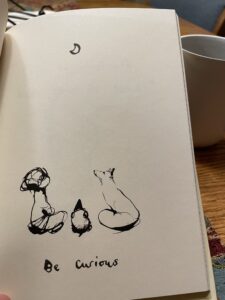06 May Is It Deception or Discernment?
In a recent Dementia Together SPECAL® workshop, a dedicated care partner and daughter mentioned a common term “therapeutic lying” as she struggled to justify following one of the SPECAL Three Golden Rules: Don’t contradict–Don’t argue with whatever facts from the past the person with dementia is matching to in order to make sense of what is currently happening in their life. With an understanding of SPECAL, the moral dilemma regarding the idea of deception becomes unnecessary. I’m grateful for the SPECAL® (pronounced “speckle”) method, an evidence-based, UK-originated dementia care model, which helps us understand, manage, and re-frame dementia in ways that no other model has been able to do with such simplicity and success. The more we understand SPECAL, the more we realize that oxymoronic, patronizing ideas and phrases like “compassionate deception,” and “therapeutic fibbing” become completely unnecessary.
Background: WHY?
SPECAL proposes: After diagnosis, for the purposes of managing the condition, dementia is best understood as the random, intermittent, and increasing inability to store the facts of what has just occurred in one’s life, while continuing to store feelings in the same way as usual.
The SPECAL® Photograph Album analogy represents each person’s memory system and is foundational in understanding the SPECAL method. The SPECAL Photograph Album allows us to visualize how every experience we have is automatically and unconsciously stored as a “photograph” that contains the facts surrounded by the associated feelings of what has just occurred in our lives. With dementia, the single change which occurs in the album is that the facts of what has just occurred are randomly, intermittently, and with increasing frequency failing to store, while the feelings continue to store in the usual way. These feelings-only photographs are called blanks, meaning blank in terms of facts. The feelings take up all the space in each photograph where the facts would normally have been stored. This explains why with dementia, feelings become more important than facts. Regardless of medical cause for dementia symptoms, this framework informs how we (people without dementia) need to adjust our communication, accommodating to the degree of “blanks” (feelings-only photographs) which are currently storing in the album of someone with dementia. SPECAL enables us to stop the well-intentioned, though misguided understanding of deception and replace it with the understanding of discernment. Discernment is simply practicing another one of the SPECAL Three Golden Rules: Listen to the expert. The person living with dementia IS the expert. No one knows how to expertly cope with a blanking album like a person who is coping with a blanking album! When we listen and learn from the expert, paying attention to their questions, phrases, and the stored facts they are matching to in their album to help make sense of current feelings, we can discern how to best respond.
 “One of our greatest freedoms is how we react to things”
“One of our greatest freedoms is how we react to things”
Reframing: WHAT?
When well-being is our goal with dementia care, discernment leads to (a term we’re coining) humble deferral™. What does it mean to defer to someone? It means allowing someone else to choose something; accepting or submitting to another person’s opinion, usually out of respect for the person’s experience as an expert. Humble deferral is reflected in a SPECAL mantra: The expert leads the way, the care companion holds the key.
With every interaction involving someone with a blanking album, we (the people without blanks in our album) simply need to ask ourselves, Whose album am I considering with this response? What response do I need to give so that I don’t disturb the sense the person with dementia is making based on the new facts that are failing to store and old facts the person is choosing to match to in order to provide context to explain the feelings they are currently experiencing? Listening to the expert means we discern when and how the person with dementia is using their album and respond in ways that don’t trip them up.
Feelings store for everyone. When we use SPECAL sense instead of common sense, we help the person use their own history and experience to make sense of what they are feeling at the moment. Our moral imperative is to promote well-being. We do this by NOT disturbing the sense the people with dementia are making for themselves–humbly deferring to what they feel makes sense so they can cope with what’s happening around them. Visualizing the album of a person with dementia enables authentic reframing from deception to discernment which leads any compassionate human to humble deferral. Humble deferral (or, an equally accurate term, compassionate deferral) is THE most respectful approach for maintaining dignity and well-being for the person living with dementia.
Practical strategies: HOW?
Using the SPECAL nonverbal communication technique known as The Interesting Tool, we can show the person with dementia with our eye contact and a pleasant facial expression that we indeed do find their words interesting. Based on the feelings storing for them, we can be authentically interested in why they are matching to whatever old facts they choose to use to help them cope. When we pay attention to which previously stored facts they are matching to, we can avoid interfering with how this helps them cope. We often don’t need to say anything. There is nothing deceptive about that. *
At one recent Dementia Together social event, our friend Phil was feeling confused about the purpose of our gathering. It was almost as if we could “see” him searching his “album” for photographs that contained facts to help him figure out why he was sitting at the table with food and drinks in a room of people visiting with one another. When he said, “I think I’m ready to order now,” it helped his companions know he was matching to a perfectly reasonable, normal, positive experience of going out to a restaurant. The old facts gave him the context he needed to make sense of what was happening. Listening to the expert, they were able to discern that Phil was ok. He wasn’t matching to anything negative or traumatic. To feel ok and not know why is no tragedy.
In contrast, to feel traumatized and not know why can be catastrophic. Another Dementia Together friend, John, had fallen, broken his ankle and was confined to bed in the hospital, connected to IVs and cardiac leads. He was indeed feeling panicked with no facts currently storing to let him know why. John very reasonably matched his current feelings with old photographs in his album that stored during a time when he was in battle, listening for enemy sounds (beeps and buzzes) that indicated danger was imminent. The noises and sense of confinement made John feel like he was trapped “in the hut” again and he needed to get out! “Let me out of the hut! I need to get out of the hut!” Even with all good intentions, staff or family speaking with logic and a calm tone of voice, explaining the actual, factual details was exactly what John did not need. “It’s ok John, you’re in the hospital…you fell and broke your ankle” simply pointed out information to him which had not stored and only served to increase agitation. John needed someone “in the hut” with him to help him out. He needed someone to employ the SPECAL strategy to “Join the club.” In this case, it was joining the “let’s get out of the hut” club. (“Let’s make this better on both of us” club.) Only by joining the person in distress, avoiding contradiction, agreeing in tone and intensity first are we able to successfully utilize additional strategies to deescalate and create well-being once again (without needing to resort to medications.) *
Humble Deferral
If promoting well-being is our goal, we must choose to respond in ways that don’t disturb the sense being made by the person living with dementia given the facts (or lack thereof) which are storing on recent “pages” in their “album.” Humble deferral.
If promoting well-being is our goal, we have a moral responsibility to consider the album of another over our own. We best honor those experiencing dementia when we let them lead the way. We honor them when we consider their album over our own in every interaction. Humble deferral.
If promoting well-being is our goal, we must ask ourselves another SPECAL mantra, for whose benefit? For whose benefit am I making this statement or giving this response? When we visualize what the album of a person with dementia looks like—with recent facts no longer storing efficiently while feelings are storing the same way as usual, we realize that our choice to avoid contradiction is not deception. It’s humility. It’s choosing humble deferral over trauma.
According to sage, author, pastor, and friend, Dick Foth, “Love is the accurate assessment and adequate supply of another person’s need.” Discernment (accurate assessment) and humble deferral (adequate supply) are required to avoid new trauma for anyone experiencing dementia. One Dementia Together care partner shared upon reflection about her use of SPECAL Sense (humble deferral) with the person in her care, “Well,…it’s just love.”
Here’s the irony of humble deferral in a world of dissension and strife. Choosing humble deferral doesn’t just work exclusively with dementia. Sometimes, we promote well-being and avoid distress and agitation for all concerned when we choose to speak less, listen more, and find it authentically interesting when anyone says or does something that challenges our own ideas. More often than not, what’s good for dementia is good for the world. Humble deferral is no exception.
Cyndy Hunt Luzinski, MS, RN, SPECAL® Practitioner
Founder and Executive Director, Dementia Together
Northern Colorado, USA
 “‘What do you think success is?’ asked the boy
“‘What do you think success is?’ asked the boy
‘To love,’ said the mole”
_____________________________________________________________________________________________________________________________________________________________
When situations involve potential danger or have escalated to distress or agitation from the use of common sense communication (vs. SPECAL sense) we are able to positively manage the perceived need for contradiction using SPECAL-inspired techniques and strategies which are beyond the scope of this blog but are addressed in Dementia Together SPECAL classes and workshops.
Credit and gratitude to Penny Garner, founder of the SPECAL® Method; Kate Sturgess; and the Contented Dementia Trust for insights, mentorship, and perseverance in sharing SPECAL globally.
Pictures and Quotes from: Mackesy, Charlie. The Boy, the Mole, the Fox and the Horse New York, NY: HarperOne, 2019.
© 2023 Dementia Together
Cyndy Hunt Luzinski, MS, RN is the founder and executive director of Dementia Together, a nonprofit organization serving more than 2000 people annually, offering education, enrichment, and hope for those living with dementia, their care partners, and the community. Cyndy is the first SPECAL® Practitioner in North America, credentialed by the Contented Dementia Trust in England. She was named 2023 Nonprofit Executive of the Year by BizWest and led Dementia Together in becoming the recipient of the 2023 Nonprofit BBB Torch Award for Ethics in Northern Colorado and Wyoming.


